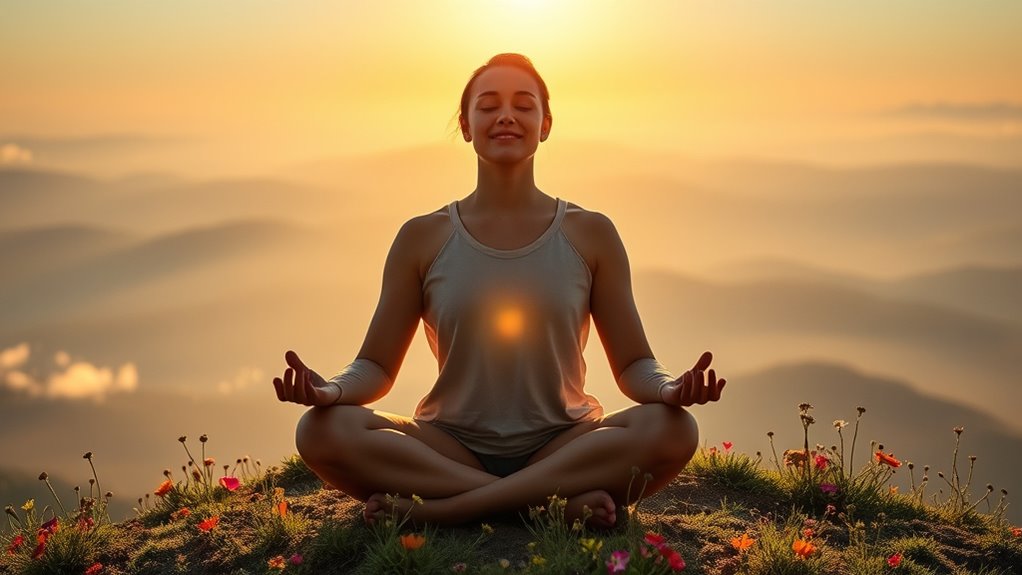Meditation is a powerful way to connect with your higher self, helping you access inner wisdom and foster spiritual growth. By practicing mindfulness and observing your thoughts without judgment, you create space for clarity and inner peace. Regular meditation deepens self-awareness, builds emotional resilience, and guides your intuition, allowing genuine inner connection to unfold. Keep exploring these practices, and you’ll discover how consistently engaging in meditation release your higher self more fully.
Key Takeaways
- Meditation cultivates inner awareness, enabling deeper connection with your higher self.
- Regular practice reduces mental clutter, creating space for spiritual insight and clarity.
- Observing thoughts non-judgmentally fosters acceptance and strengthens inner wisdom.
- Mindfulness during meditation enhances emotional resilience and inner peace.
- Connecting with the higher self through meditation empowers authentic living and personal growth.

Meditation has become a powerful tool for transforming your mental and physical well-being. As you explore this practice, you discover that incorporating mindfulness practices into your daily routine allows you to stay present and aware of your thoughts, feelings, and surroundings. Mindfulness helps you break free from automatic reactions, giving you space to respond thoughtfully rather than impulsively. This heightened awareness becomes the foundation for connecting with your higher self, guiding you toward clarity and inner peace.
By engaging in regular meditation, you tap into stress reduction techniques that alleviate the mental clutter and emotional tension often carried throughout the day. When you sit quietly and focus on your breath or a specific mantra, you create a safe mental space where stress begins to melt away. These techniques aren’t just about relaxation; they serve as bridges to deeper self-awareness and spiritual growth. As you deepen your practice, you start noticing how your mind becomes calmer and more centered, even amid chaos. This calmness allows you to access your higher self—your true essence—more easily.
Regular meditation clears mental clutter and opens the door to your higher self and spiritual growth.
Meditation encourages you to observe your thoughts without judgment, fostering a sense of acceptance and compassion toward yourself. This non-reactive stance opens the door to recognizing patterns and beliefs that may be holding you back. Over time, you realize that your higher self isn’t some distant entity but a part of you that’s always present, waiting to be acknowledged. Through consistent practice, you build a stronger connection with this inner wisdom, which guides your decisions, enhances your intuition, and nurtures your sense of purpose.
Incorporating mindfulness practices into your meditation sessions amplifies these benefits. You learn to be fully present in each moment, which strengthens your ability to listen inwardly and connect with your higher self. The act of being mindful during meditation helps you transcend everyday distractions, leading to moments of insight and spiritual awakening. As you cultivate this connection, you start noticing subtle shifts in your perspective and emotional resilience, empowering you to face challenges with greater ease.
Ultimately, meditation becomes a pathway to self-discovery and spiritual alignment. It transforms your understanding of yourself and your place in the universe, helping you realize that your higher self is always accessible. With patience and consistency, you can harness the power of meditation to elevate your consciousness, deepen your inner connection, and live with greater intention and authenticity.
Frequently Asked Questions
Can Meditation Help With Chronic Health Issues?
Yes, meditation can help with chronic health issues by promoting mindfulness practices that reduce stress and improve overall well-being. When you meditate regularly, you activate your body’s relaxation response, which can lessen symptoms and enhance your quality of life. By focusing on your breath and calming your mind, you manage pain, inflammation, and fatigue better. Consistent meditation supports your health journey, making it a valuable tool alongside medical treatments.
How Long Does It Take to Feel Results From Meditation?
Most people notice emotional benefits from meditation within just a few days, with some feeling calmer after only 10 minutes. Research shows consistent practice with mindfulness techniques can improve mood and reduce stress in as little as two weeks. You might start feeling results sooner if you meditate regularly, as your brain adapts to the calming effects. Keep practicing, and those emotional benefits will become more noticeable over time.
Is Meditation Suitable for Children and Teenagers?
Yes, meditation is suitable for children and teenagers. You can introduce mindfulness practices and simple breathing exercises tailored to their age. These techniques help improve focus, reduce stress, and promote emotional well-being. Keep sessions short and engaging, gradually increasing duration. Encourage consistency, making meditation a fun daily habit. By doing so, you’ll help them develop valuable skills that benefit their mental health and overall growth.
What Are Common Meditation Mistakes to Avoid?
Imagine trying to tune a delicate instrument—you might hit wrong notes if you’re rushing or distracted. Common meditation mistakes include rushing through mindfulness techniques, not focusing on your breathing exercises, or expecting instant results. To avoid these, stay patient, keep your attention gentle and steady, and practice regularly. Remember, meditation is a journey, not a sprint—so be kind to yourself and nurture your practice patiently.
Can Meditation Replace Traditional Therapy or Medication?
Meditation can’t fully replace traditional therapy or medication, especially for serious mental health issues. While mindfulness techniques foster spiritual growth and help manage stress, they work best alongside professional treatment. You should see a mental health expert if you’re dealing with ongoing emotional or psychological challenges. Combining meditation with therapy can boost your overall well-being, supporting your journey toward greater self-awareness and mental resilience.
Conclusion
Incorporating meditation into your daily routine can truly transform your life. Studies show that just 10 minutes of meditation a day can reduce stress by up to 30%, helping you connect more deeply with your higher self. So, take a moment to breathe, relax, and tune in. The more you practice, the clearer your inner wisdom becomes, guiding you toward a more peaceful, authentic life. Start today—you’ll be amazed at the difference it makes.









